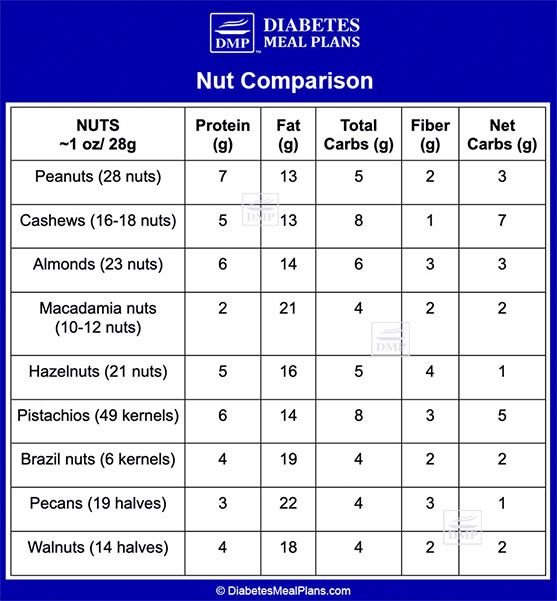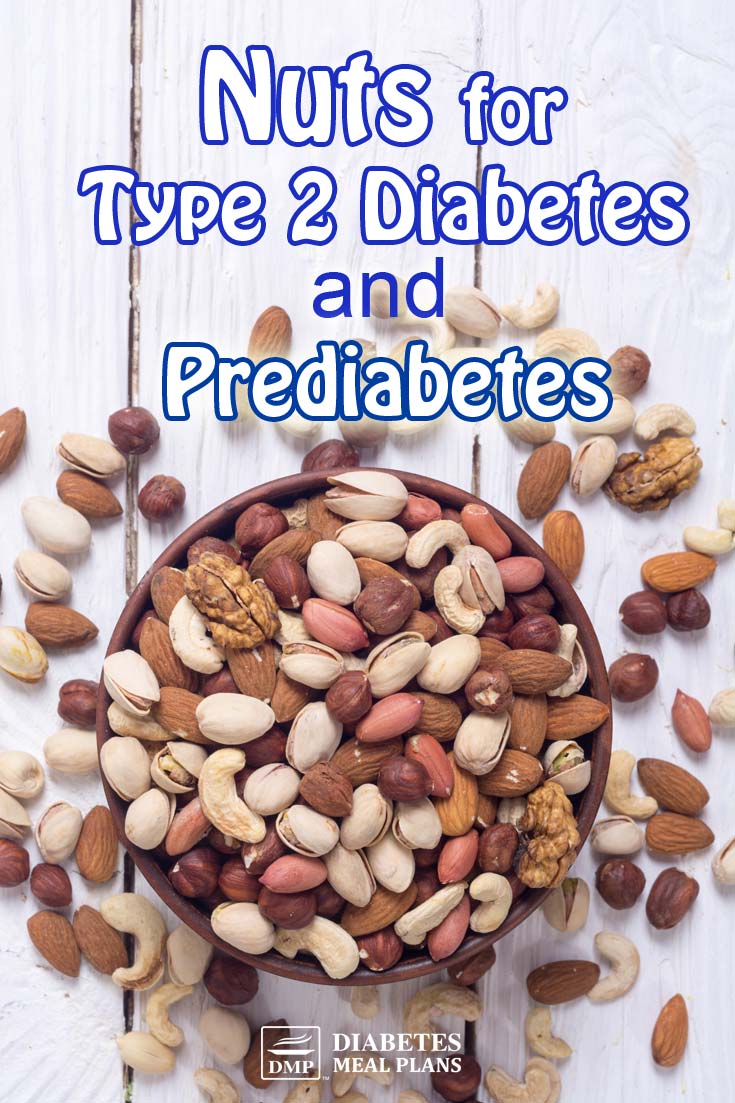Tree nuts are a favorite snack around the world. They taste great, they are easily portable, and they are super nutritious!
There are many kinds of nuts to be enjoyed… walnuts, almonds, macadamia nuts, cashews, pecans, pistachios, pine nuts, hazelnuts, Brazil nuts, and many more!
Below we’ll be focusing on a few of the most popular nuts used for cooking, baking, and snacking, along with their specific benefits for people with type 2 diabetes and prediabetes.

Nutrition Facts for Nuts
Tree nuts are infamous for their high fat content. And while that may seem like a “bad” thing, it’s actually a blessing in disguise.
While many people are still stuck in the age-old “low fat” mindset, it’s really old news.
The thing is, you can’t live without fats. They are needed for many physical functions from building cells, to sustaining hormone levels, to assisting with optimal brain function.
And research continues to prove time and time again, that fats in our diet are not the problem. Especially healthy fats (and other nutrients) found in nuts – these are extremely good for you.
Most nuts have a pretty impressive nutrient profile. But to get an overview, let’s use almonds as an example.
One ounce (28g) of almonds (about 23 nuts) contains:
- Calories: 164
- Fats: 14.2g
- Protein: 6.0g
- Carbohydrates: 6.1g
- Dietary fiber: 3.5g
- Monounsaturated fats: 8.9g
- Polyunsaturated fats: 3.5g
- Saturated fats: 1.1g
Sure, fat is the main macronutrient in almonds, as it is in all nuts. However, almonds (and other nuts) are also very high in protein and they contain a significant amount of dietary fiber – this fat, protein, fiber combo helps to keep your appetite satisfied and helps stabilize blood sugar levels, too.
Almonds also contain micronutrients:
- Calcium (96 mg) – needed for healthy bones
- Magnesium (96 mg) – needed for more than 300 enzymatic processes in the body
- Potassium (262 mg) – beneficial for blood pressure
- Phosphorus (172 mg) – needed for bone mineralization, energy production and cell signaling
- Vitamin E (9 mg) – a powerful antioxidant to fight free radicals
Pretty impressive for a small handful of crunchy enjoyment, right?
And if that’s not enough to impress, nuts are also a good source of powerful polyphenols such as:
- catechins
- proanthocyanidins
- ellagitannins
- and ellagic acid
And in terms of nutrition, you’ll soon see that other nuts are quite similar to almonds…
Different Nuts Compared

As you can see, some nuts are a little higher in carbs than others.
Cashews, for example, contain 8.6g of carbs and have the lowest amount of fiber with 0.9g per serving. In fact, cashews aren’t technically a nut at all, they are actually a legume.
Still, most nuts are a safe and blood sugar friendly food you can enjoy. And that includes nut butters like peanut butter, almond butter etc.

Research on Nuts and Diabetes/ Prediabetes
Improve your heart health
One study recruited over 7,000 participants with a high cardiovascular risk. The researchers allocated people to one of 3 different diets:
- A Mediterranean diet with olive oil
- A Mediterranean diet with mixed nuts
- Or a low fat diet
After they followed up with participants after 4 years, they found that those who consumed a Mediterranean diet with either olive oil or nuts had a decreased likelihood of having a heart attack or stroke.
A review of various studies reports that consuming an average one ounce (28g) of nuts per day reduces people’s risk of ischemic heart disease (thickening/ plaque build-up in the arteries that negatively effects blood flow and leads to heart attack and stroke), and prevents diabetes.
Another review concluded that nut intake prevents ischemic heart disease, overall heart disease and risk of death from heart conditions. And they have been shown to be beneficial for cholesterol levels, not the opposite as you’d expect.
Yet another review concluded that consuming at least one ounce (28g) of nuts per day can not only prevent cardiovascular disease but lower risk of cancer and death from heart disease, diabetes and infections.
The researchers claim the benefits of nuts are so great that they had the potential to prevent 4.4 million premature deaths across America, Europe, Southeast Asia, and Western Pacific in 2013 – now that’s really saying something!
Improve insulin resistance
When researchers evaluated the effects of different diets on insulin sensitivity, they found that replacing carbohydrates with unsaturated fat improved insulin sensitivity in people at high risk of cardiovascular disease, without affecting their weight.
Assist with blood glucose regulation
Nuts contain very little carbohydrates and ample fiber and fat, so eaten on their they have very little impact on blood glucose levels. Studies have also shown that when you eat nuts alongside carbohydrate-rich foods, it helps blunt the sugar spikes that follow.
That’s certainly not a free license to consume more carbs, but indicates the benefits of nuts in better blood sugar management!
Reduce inflammation
The umbrella of “polyunsaturated fats” include omega-3 fatty acids – a type of fat that is best known for it’s anti-inflammatory powers.
In fact, researchers have discovered that omega-3s are so good at their job that they may have the potential to prevent metabolic disorders, such as type 2 diabetes – great news for those with prediabetes.
Studies have found that omega-3 supplementation (in conjunction with a low carb diet, of course) produced improved glycemic control, reduced inflammation levels, and a smaller waist circumference among patients who were fully diabetic.
Regulate your appetite
Because nuts are so satisfying to the appetite, research shows that when you switch to eating nuts as a snack, it can help:
- reduce your intake of refined carbohydrates
- reduce intake of empty calories
- won’t impact your weight loss
- improves appetite control overall
Conclusion: It’s ok to go nuts over nuts!
Nuts are rich in nourishing fats, stabilizing proteins, and hearty fibers, making them the perfect snack for people with type 2 diabetics and pre-diabetess alike!
For a daily dose of health benefits, you can replace meat with nuts in salads or stir fries, stir them into Greek yogurt, or make homemade trail mix – without the high carb fruit, of course. 😉
What’s your favorite nut to munch on?

What you say abou huts is all very well, but as a 73 tr old male with type 2 dibetes, while I consume many of the nuts you listed, as well as fresh vegetables , every my weight (currently just under 17 and a 1/2 stone, continues to increase. So, am I fooling myself that I am eating the correct food stuffs, to both reduce my weight, and lower my A1c level hovers around the ’58’ level.
Maybe not fooling yourself Russ, but it may not be nuts increasing weight. It could be anything in your diet so perhaps try keeping a food diary and making a few adjustments.
This is only the second site that I have found help!! I am on my own! After reading and viewing material by Dr Jason Fung I realized traditional care for diabetes wasn’t the best approach for people with diabetes, including me. I 🙏🏽people don’t become complacent with other doctors when things aren’t working. May we all seek to find the best care for ourselves. Thank you .